Deconstructing Assumptions: Essay on Indigenous Health in NURS1008
VerifiedAdded on 2022/12/27
|10
|2615
|1
Essay
AI Summary
This essay provides a deconstruction analysis of the question, "Why don’t Aboriginal people take an interest in their own health?" The essay begins by dissecting the terminology used in the question, highlighting the potential for misinterpretation and the historical context of poor health outcomes among Aboriginal populations in Australia. It then examines the assumptions underlying the question, emphasizing the role of non-Indigenous perspectives, historical injustices like colonization and the stolen generations, and social determinants of health such as poverty and lack of access to healthcare. The essay also explores the stereotypes embedded within the question, which reflect non-Indigenous biases and a lack of cultural understanding. The discussion section highlights the disparities in health outcomes and the impact of social determinants and power dynamics on Indigenous health. The essay concludes by emphasizing the need for culturally competent healthcare practices, the importance of challenging assumptions, and the need for healthcare professionals to gain in-depth knowledge of Indigenous cultures, histories, and values to provide safe and responsive care. References to peer-reviewed journal articles support the analysis and recommendations.
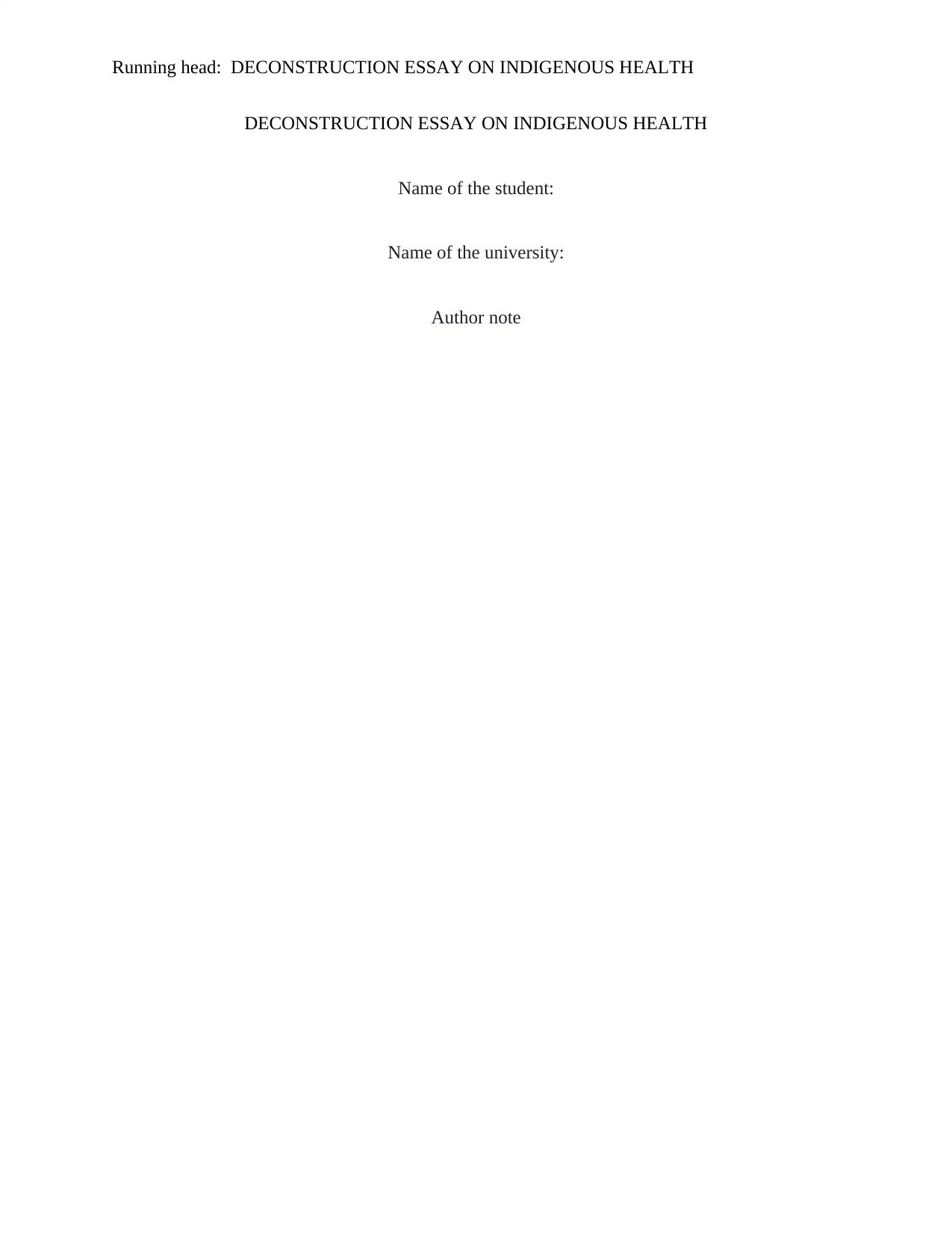
Running head: DECONSTRUCTION ESSAY ON INDIGENOUS HEALTH
DECONSTRUCTION ESSAY ON INDIGENOUS HEALTH
Name of the student:
Name of the university:
Author note
DECONSTRUCTION ESSAY ON INDIGENOUS HEALTH
Name of the student:
Name of the university:
Author note
Paraphrase This Document
Need a fresh take? Get an instant paraphrase of this document with our AI Paraphraser
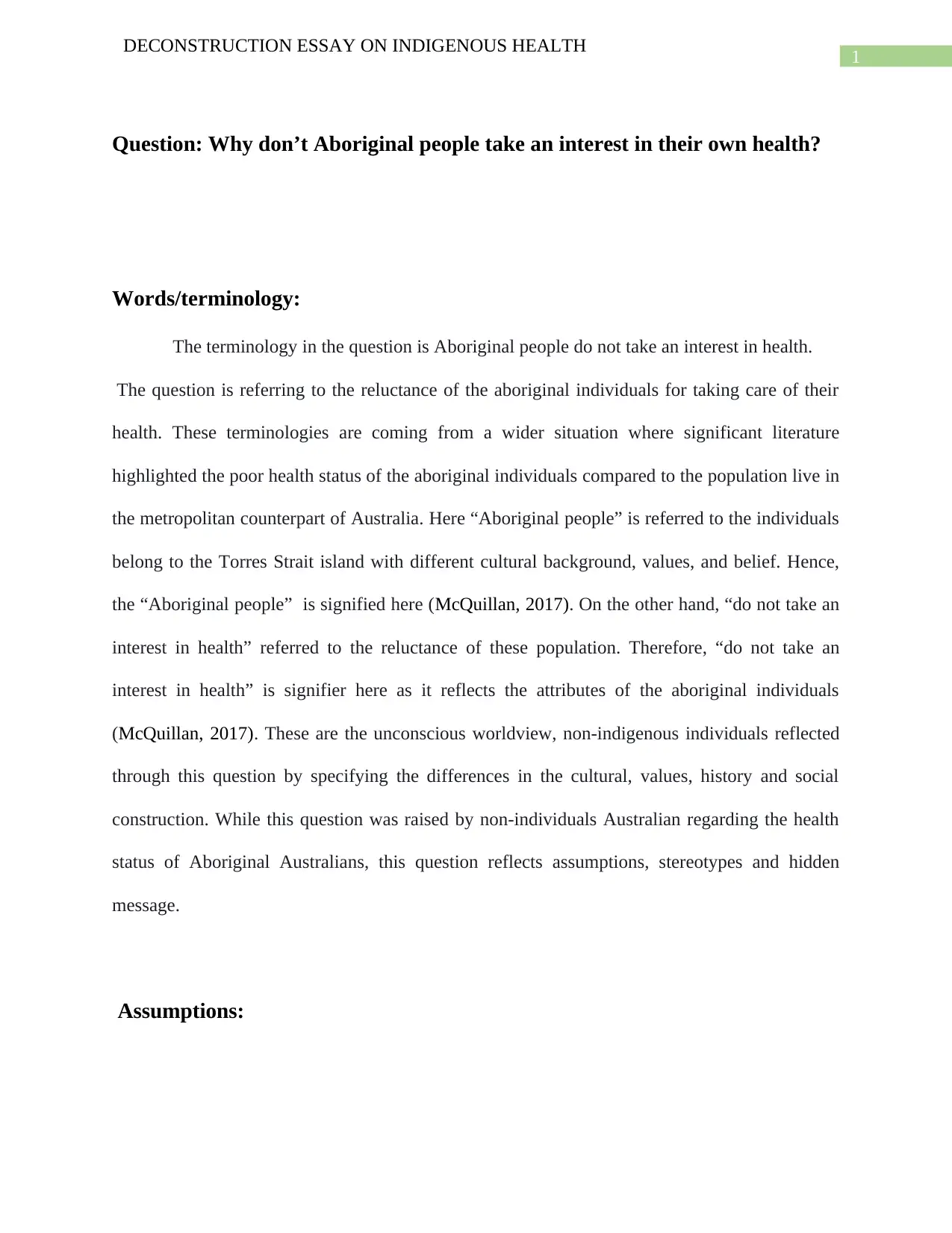
1
DECONSTRUCTION ESSAY ON INDIGENOUS HEALTH
Question: Why don’t Aboriginal people take an interest in their own health?
Words/terminology:
The terminology in the question is Aboriginal people do not take an interest in health.
The question is referring to the reluctance of the aboriginal individuals for taking care of their
health. These terminologies are coming from a wider situation where significant literature
highlighted the poor health status of the aboriginal individuals compared to the population live in
the metropolitan counterpart of Australia. Here “Aboriginal people” is referred to the individuals
belong to the Torres Strait island with different cultural background, values, and belief. Hence,
the “Aboriginal people” is signified here (McQuillan, 2017). On the other hand, “do not take an
interest in health” referred to the reluctance of these population. Therefore, “do not take an
interest in health” is signifier here as it reflects the attributes of the aboriginal individuals
(McQuillan, 2017). These are the unconscious worldview, non-indigenous individuals reflected
through this question by specifying the differences in the cultural, values, history and social
construction. While this question was raised by non-individuals Australian regarding the health
status of Aboriginal Australians, this question reflects assumptions, stereotypes and hidden
message.
Assumptions:
DECONSTRUCTION ESSAY ON INDIGENOUS HEALTH
Question: Why don’t Aboriginal people take an interest in their own health?
Words/terminology:
The terminology in the question is Aboriginal people do not take an interest in health.
The question is referring to the reluctance of the aboriginal individuals for taking care of their
health. These terminologies are coming from a wider situation where significant literature
highlighted the poor health status of the aboriginal individuals compared to the population live in
the metropolitan counterpart of Australia. Here “Aboriginal people” is referred to the individuals
belong to the Torres Strait island with different cultural background, values, and belief. Hence,
the “Aboriginal people” is signified here (McQuillan, 2017). On the other hand, “do not take an
interest in health” referred to the reluctance of these population. Therefore, “do not take an
interest in health” is signifier here as it reflects the attributes of the aboriginal individuals
(McQuillan, 2017). These are the unconscious worldview, non-indigenous individuals reflected
through this question by specifying the differences in the cultural, values, history and social
construction. While this question was raised by non-individuals Australian regarding the health
status of Aboriginal Australians, this question reflects assumptions, stereotypes and hidden
message.
Assumptions:
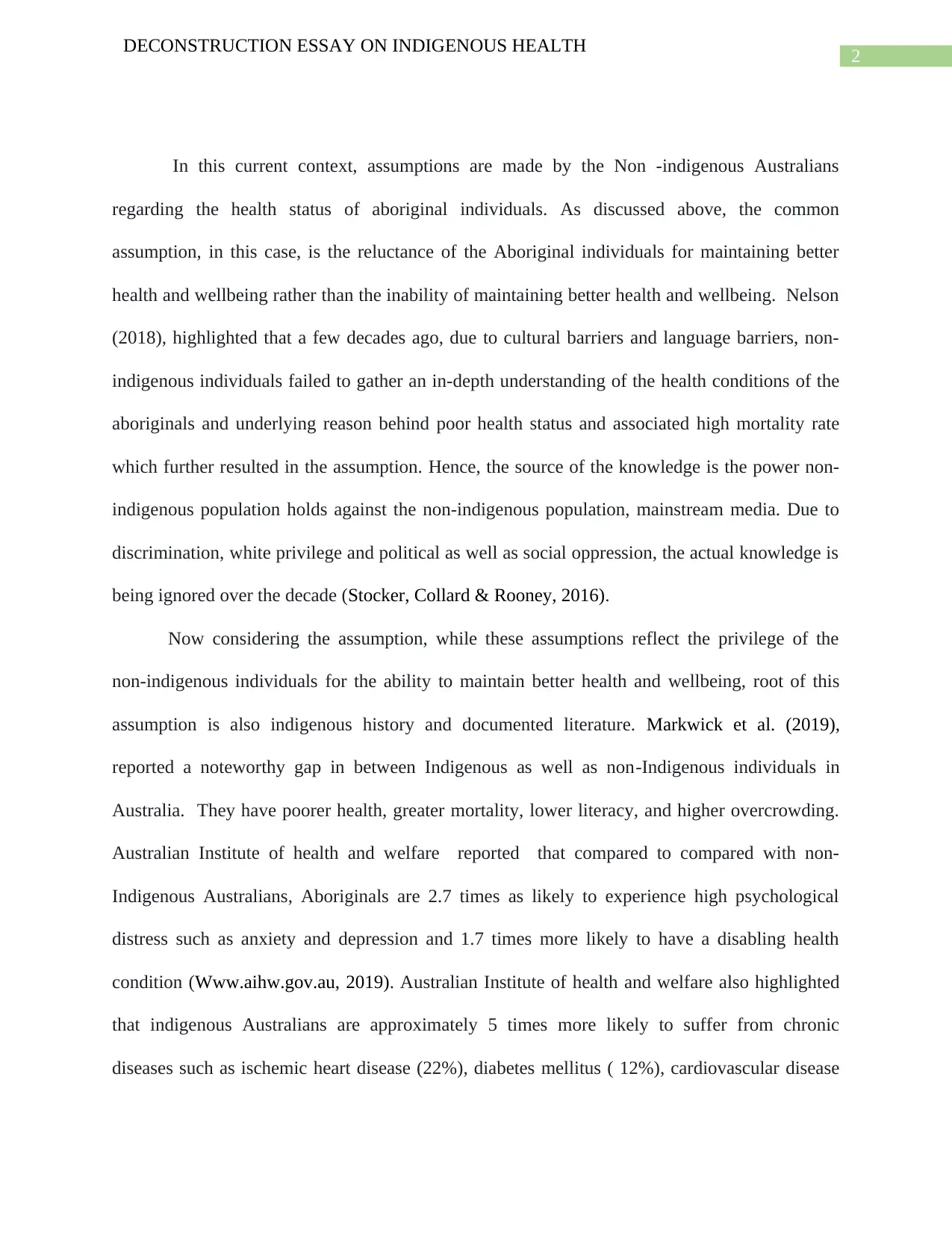
2
DECONSTRUCTION ESSAY ON INDIGENOUS HEALTH
In this current context, assumptions are made by the Non -indigenous Australians
regarding the health status of aboriginal individuals. As discussed above, the common
assumption, in this case, is the reluctance of the Aboriginal individuals for maintaining better
health and wellbeing rather than the inability of maintaining better health and wellbeing. Nelson
(2018), highlighted that a few decades ago, due to cultural barriers and language barriers, non-
indigenous individuals failed to gather an in-depth understanding of the health conditions of the
aboriginals and underlying reason behind poor health status and associated high mortality rate
which further resulted in the assumption. Hence, the source of the knowledge is the power non-
indigenous population holds against the non-indigenous population, mainstream media. Due to
discrimination, white privilege and political as well as social oppression, the actual knowledge is
being ignored over the decade (Stocker, Collard & Rooney, 2016).
Now considering the assumption, while these assumptions reflect the privilege of the
non-indigenous individuals for the ability to maintain better health and wellbeing, root of this
assumption is also indigenous history and documented literature. Markwick et al. (2019),
reported a noteworthy gap in between Indigenous as well as non-Indigenous individuals in
Australia. They have poorer health, greater mortality, lower literacy, and higher overcrowding.
Australian Institute of health and welfare reported that compared to compared with non-
Indigenous Australians, Aboriginals are 2.7 times as likely to experience high psychological
distress such as anxiety and depression and 1.7 times more likely to have a disabling health
condition (Www.aihw.gov.au, 2019). Australian Institute of health and welfare also highlighted
that indigenous Australians are approximately 5 times more likely to suffer from chronic
diseases such as ischemic heart disease (22%), diabetes mellitus ( 12%), cardiovascular disease
DECONSTRUCTION ESSAY ON INDIGENOUS HEALTH
In this current context, assumptions are made by the Non -indigenous Australians
regarding the health status of aboriginal individuals. As discussed above, the common
assumption, in this case, is the reluctance of the Aboriginal individuals for maintaining better
health and wellbeing rather than the inability of maintaining better health and wellbeing. Nelson
(2018), highlighted that a few decades ago, due to cultural barriers and language barriers, non-
indigenous individuals failed to gather an in-depth understanding of the health conditions of the
aboriginals and underlying reason behind poor health status and associated high mortality rate
which further resulted in the assumption. Hence, the source of the knowledge is the power non-
indigenous population holds against the non-indigenous population, mainstream media. Due to
discrimination, white privilege and political as well as social oppression, the actual knowledge is
being ignored over the decade (Stocker, Collard & Rooney, 2016).
Now considering the assumption, while these assumptions reflect the privilege of the
non-indigenous individuals for the ability to maintain better health and wellbeing, root of this
assumption is also indigenous history and documented literature. Markwick et al. (2019),
reported a noteworthy gap in between Indigenous as well as non-Indigenous individuals in
Australia. They have poorer health, greater mortality, lower literacy, and higher overcrowding.
Australian Institute of health and welfare reported that compared to compared with non-
Indigenous Australians, Aboriginals are 2.7 times as likely to experience high psychological
distress such as anxiety and depression and 1.7 times more likely to have a disabling health
condition (Www.aihw.gov.au, 2019). Australian Institute of health and welfare also highlighted
that indigenous Australians are approximately 5 times more likely to suffer from chronic
diseases such as ischemic heart disease (22%), diabetes mellitus ( 12%), cardiovascular disease
⊘ This is a preview!⊘
Do you want full access?
Subscribe today to unlock all pages.

Trusted by 1+ million students worldwide
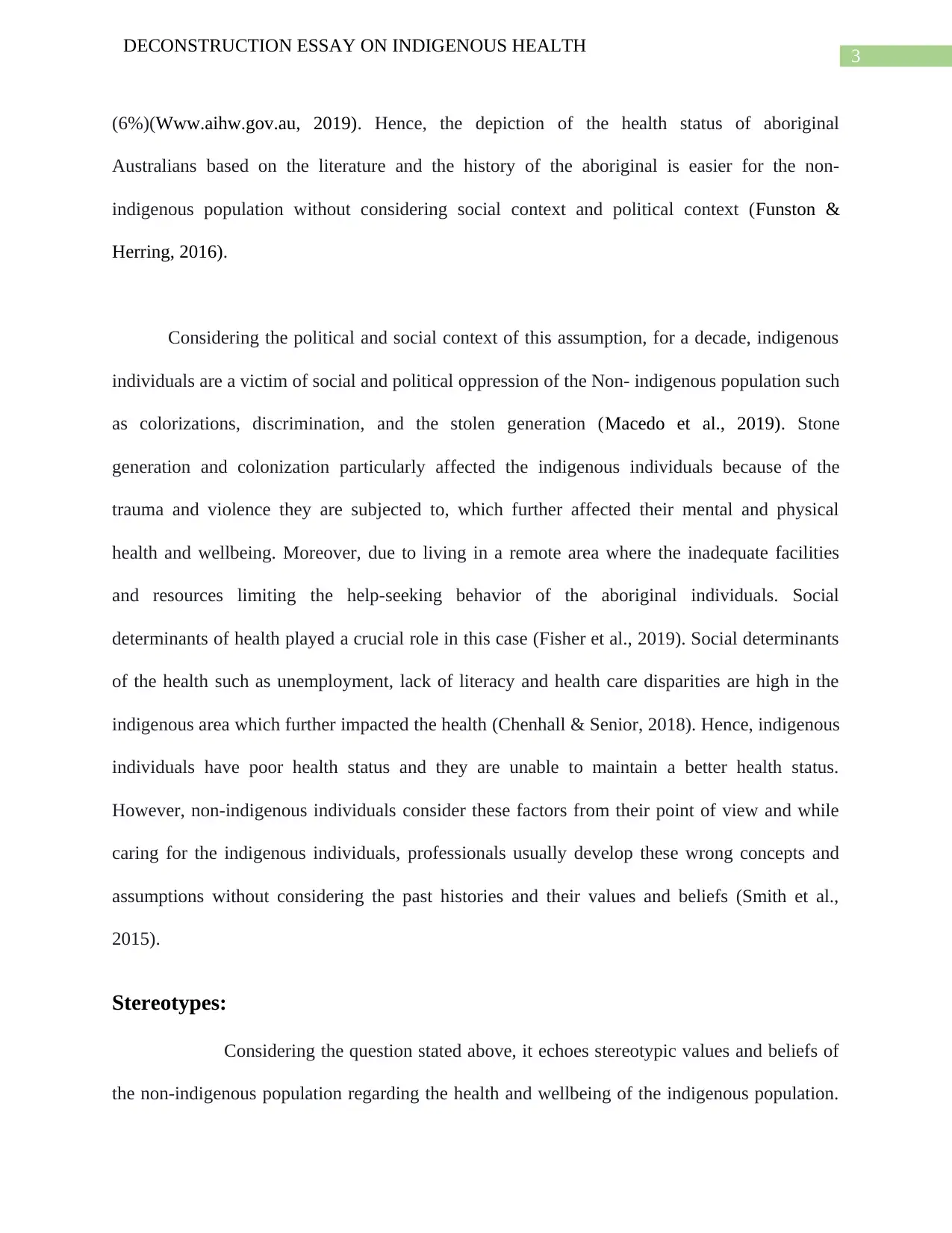
3
DECONSTRUCTION ESSAY ON INDIGENOUS HEALTH
(6%)(Www.aihw.gov.au, 2019). Hence, the depiction of the health status of aboriginal
Australians based on the literature and the history of the aboriginal is easier for the non-
indigenous population without considering social context and political context (Funston &
Herring, 2016).
Considering the political and social context of this assumption, for a decade, indigenous
individuals are a victim of social and political oppression of the Non- indigenous population such
as colorizations, discrimination, and the stolen generation (Macedo et al., 2019). Stone
generation and colonization particularly affected the indigenous individuals because of the
trauma and violence they are subjected to, which further affected their mental and physical
health and wellbeing. Moreover, due to living in a remote area where the inadequate facilities
and resources limiting the help-seeking behavior of the aboriginal individuals. Social
determinants of health played a crucial role in this case (Fisher et al., 2019). Social determinants
of the health such as unemployment, lack of literacy and health care disparities are high in the
indigenous area which further impacted the health (Chenhall & Senior, 2018). Hence, indigenous
individuals have poor health status and they are unable to maintain a better health status.
However, non-indigenous individuals consider these factors from their point of view and while
caring for the indigenous individuals, professionals usually develop these wrong concepts and
assumptions without considering the past histories and their values and beliefs (Smith et al.,
2015).
Stereotypes:
Considering the question stated above, it echoes stereotypic values and beliefs of
the non-indigenous population regarding the health and wellbeing of the indigenous population.
DECONSTRUCTION ESSAY ON INDIGENOUS HEALTH
(6%)(Www.aihw.gov.au, 2019). Hence, the depiction of the health status of aboriginal
Australians based on the literature and the history of the aboriginal is easier for the non-
indigenous population without considering social context and political context (Funston &
Herring, 2016).
Considering the political and social context of this assumption, for a decade, indigenous
individuals are a victim of social and political oppression of the Non- indigenous population such
as colorizations, discrimination, and the stolen generation (Macedo et al., 2019). Stone
generation and colonization particularly affected the indigenous individuals because of the
trauma and violence they are subjected to, which further affected their mental and physical
health and wellbeing. Moreover, due to living in a remote area where the inadequate facilities
and resources limiting the help-seeking behavior of the aboriginal individuals. Social
determinants of health played a crucial role in this case (Fisher et al., 2019). Social determinants
of the health such as unemployment, lack of literacy and health care disparities are high in the
indigenous area which further impacted the health (Chenhall & Senior, 2018). Hence, indigenous
individuals have poor health status and they are unable to maintain a better health status.
However, non-indigenous individuals consider these factors from their point of view and while
caring for the indigenous individuals, professionals usually develop these wrong concepts and
assumptions without considering the past histories and their values and beliefs (Smith et al.,
2015).
Stereotypes:
Considering the question stated above, it echoes stereotypic values and beliefs of
the non-indigenous population regarding the health and wellbeing of the indigenous population.
Paraphrase This Document
Need a fresh take? Get an instant paraphrase of this document with our AI Paraphraser
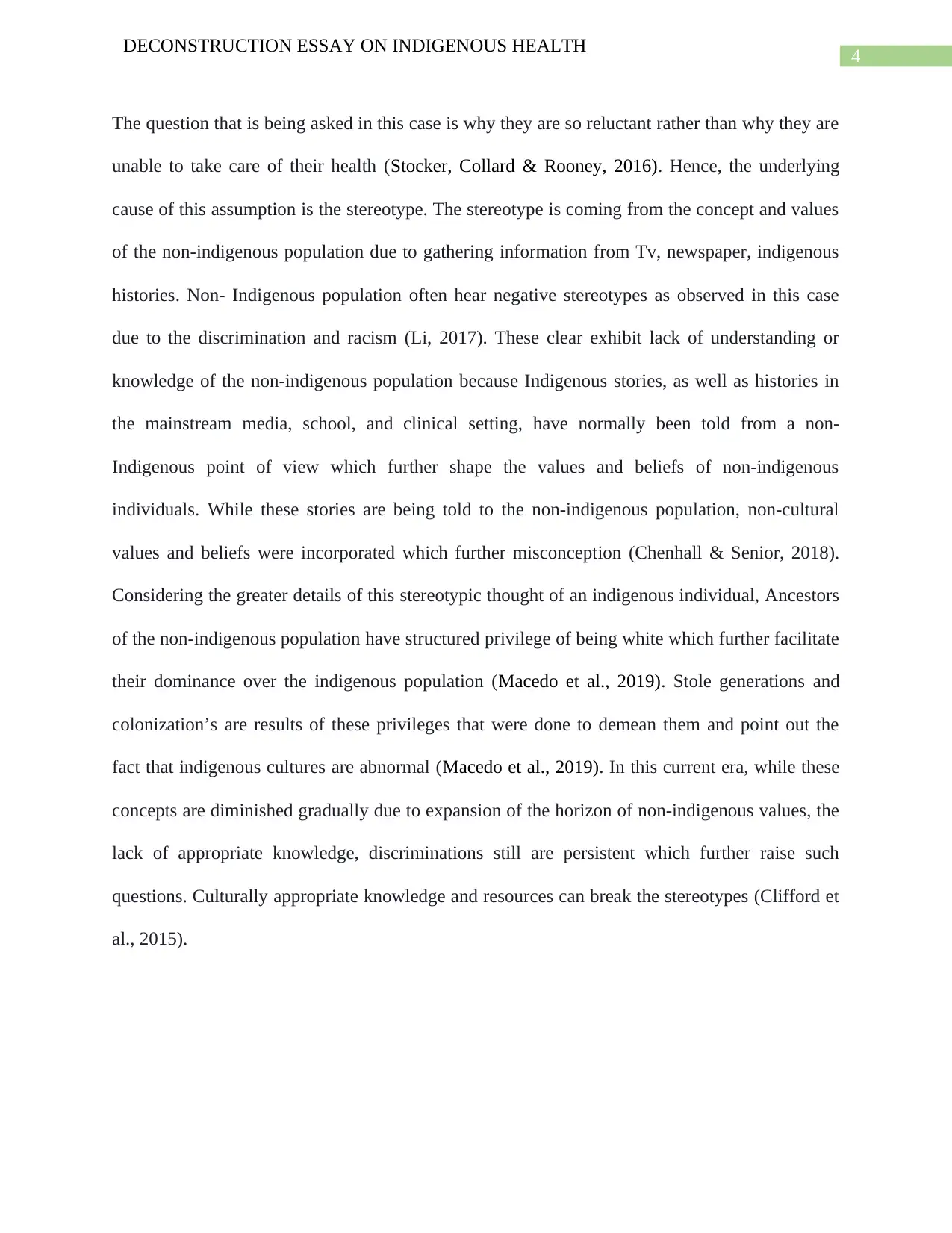
4
DECONSTRUCTION ESSAY ON INDIGENOUS HEALTH
The question that is being asked in this case is why they are so reluctant rather than why they are
unable to take care of their health (Stocker, Collard & Rooney, 2016). Hence, the underlying
cause of this assumption is the stereotype. The stereotype is coming from the concept and values
of the non-indigenous population due to gathering information from Tv, newspaper, indigenous
histories. Non- Indigenous population often hear negative stereotypes as observed in this case
due to the discrimination and racism (Li, 2017). These clear exhibit lack of understanding or
knowledge of the non-indigenous population because Indigenous stories, as well as histories in
the mainstream media, school, and clinical setting, have normally been told from a non-
Indigenous point of view which further shape the values and beliefs of non-indigenous
individuals. While these stories are being told to the non-indigenous population, non-cultural
values and beliefs were incorporated which further misconception (Chenhall & Senior, 2018).
Considering the greater details of this stereotypic thought of an indigenous individual, Ancestors
of the non-indigenous population have structured privilege of being white which further facilitate
their dominance over the indigenous population (Macedo et al., 2019). Stole generations and
colonization’s are results of these privileges that were done to demean them and point out the
fact that indigenous cultures are abnormal (Macedo et al., 2019). In this current era, while these
concepts are diminished gradually due to expansion of the horizon of non-indigenous values, the
lack of appropriate knowledge, discriminations still are persistent which further raise such
questions. Culturally appropriate knowledge and resources can break the stereotypes (Clifford et
al., 2015).
DECONSTRUCTION ESSAY ON INDIGENOUS HEALTH
The question that is being asked in this case is why they are so reluctant rather than why they are
unable to take care of their health (Stocker, Collard & Rooney, 2016). Hence, the underlying
cause of this assumption is the stereotype. The stereotype is coming from the concept and values
of the non-indigenous population due to gathering information from Tv, newspaper, indigenous
histories. Non- Indigenous population often hear negative stereotypes as observed in this case
due to the discrimination and racism (Li, 2017). These clear exhibit lack of understanding or
knowledge of the non-indigenous population because Indigenous stories, as well as histories in
the mainstream media, school, and clinical setting, have normally been told from a non-
Indigenous point of view which further shape the values and beliefs of non-indigenous
individuals. While these stories are being told to the non-indigenous population, non-cultural
values and beliefs were incorporated which further misconception (Chenhall & Senior, 2018).
Considering the greater details of this stereotypic thought of an indigenous individual, Ancestors
of the non-indigenous population have structured privilege of being white which further facilitate
their dominance over the indigenous population (Macedo et al., 2019). Stole generations and
colonization’s are results of these privileges that were done to demean them and point out the
fact that indigenous cultures are abnormal (Macedo et al., 2019). In this current era, while these
concepts are diminished gradually due to expansion of the horizon of non-indigenous values, the
lack of appropriate knowledge, discriminations still are persistent which further raise such
questions. Culturally appropriate knowledge and resources can break the stereotypes (Clifford et
al., 2015).
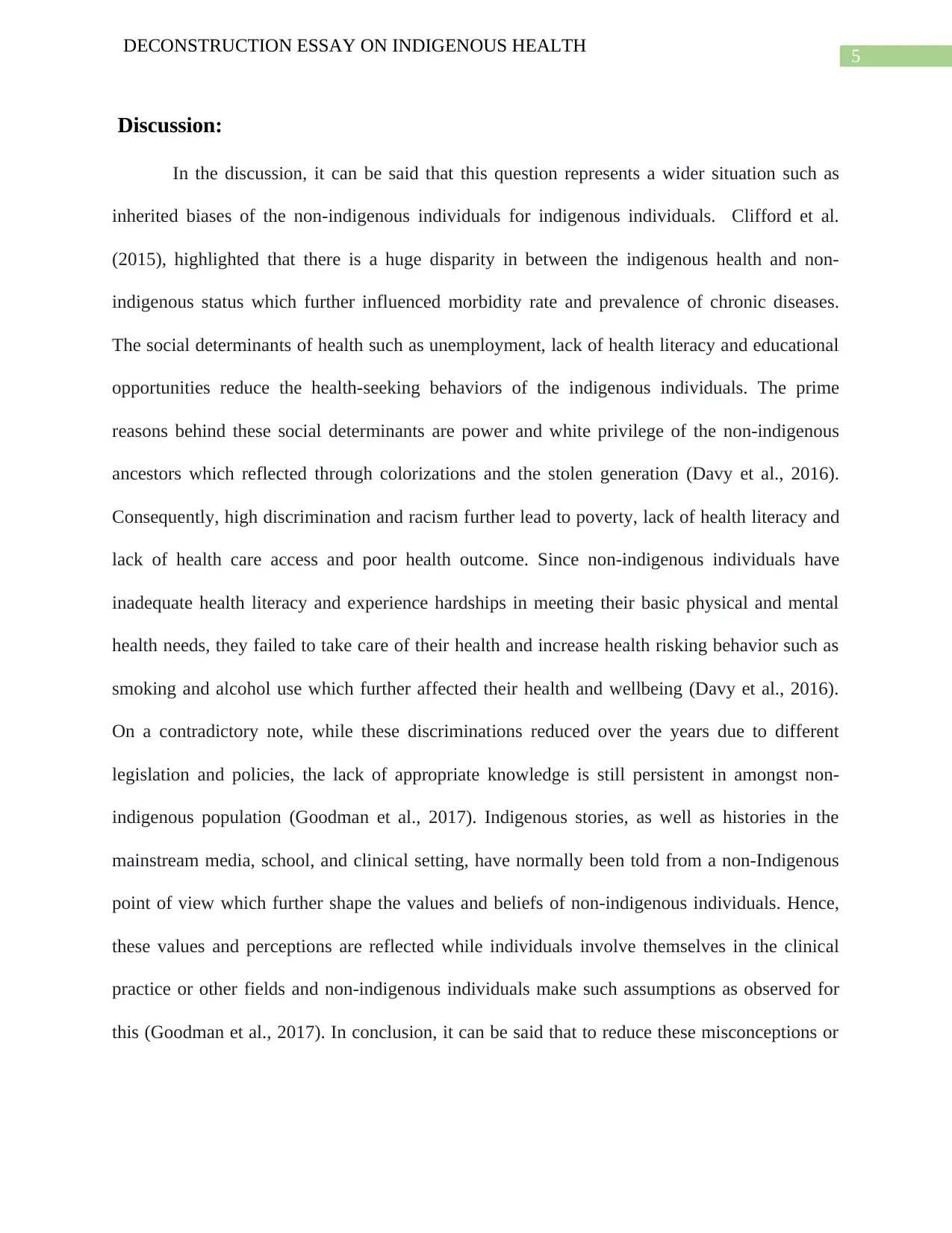
5
DECONSTRUCTION ESSAY ON INDIGENOUS HEALTH
Discussion:
In the discussion, it can be said that this question represents a wider situation such as
inherited biases of the non-indigenous individuals for indigenous individuals. Clifford et al.
(2015), highlighted that there is a huge disparity in between the indigenous health and non-
indigenous status which further influenced morbidity rate and prevalence of chronic diseases.
The social determinants of health such as unemployment, lack of health literacy and educational
opportunities reduce the health-seeking behaviors of the indigenous individuals. The prime
reasons behind these social determinants are power and white privilege of the non-indigenous
ancestors which reflected through colorizations and the stolen generation (Davy et al., 2016).
Consequently, high discrimination and racism further lead to poverty, lack of health literacy and
lack of health care access and poor health outcome. Since non-indigenous individuals have
inadequate health literacy and experience hardships in meeting their basic physical and mental
health needs, they failed to take care of their health and increase health risking behavior such as
smoking and alcohol use which further affected their health and wellbeing (Davy et al., 2016).
On a contradictory note, while these discriminations reduced over the years due to different
legislation and policies, the lack of appropriate knowledge is still persistent in amongst non-
indigenous population (Goodman et al., 2017). Indigenous stories, as well as histories in the
mainstream media, school, and clinical setting, have normally been told from a non-Indigenous
point of view which further shape the values and beliefs of non-indigenous individuals. Hence,
these values and perceptions are reflected while individuals involve themselves in the clinical
practice or other fields and non-indigenous individuals make such assumptions as observed for
this (Goodman et al., 2017). In conclusion, it can be said that to reduce these misconceptions or
DECONSTRUCTION ESSAY ON INDIGENOUS HEALTH
Discussion:
In the discussion, it can be said that this question represents a wider situation such as
inherited biases of the non-indigenous individuals for indigenous individuals. Clifford et al.
(2015), highlighted that there is a huge disparity in between the indigenous health and non-
indigenous status which further influenced morbidity rate and prevalence of chronic diseases.
The social determinants of health such as unemployment, lack of health literacy and educational
opportunities reduce the health-seeking behaviors of the indigenous individuals. The prime
reasons behind these social determinants are power and white privilege of the non-indigenous
ancestors which reflected through colorizations and the stolen generation (Davy et al., 2016).
Consequently, high discrimination and racism further lead to poverty, lack of health literacy and
lack of health care access and poor health outcome. Since non-indigenous individuals have
inadequate health literacy and experience hardships in meeting their basic physical and mental
health needs, they failed to take care of their health and increase health risking behavior such as
smoking and alcohol use which further affected their health and wellbeing (Davy et al., 2016).
On a contradictory note, while these discriminations reduced over the years due to different
legislation and policies, the lack of appropriate knowledge is still persistent in amongst non-
indigenous population (Goodman et al., 2017). Indigenous stories, as well as histories in the
mainstream media, school, and clinical setting, have normally been told from a non-Indigenous
point of view which further shape the values and beliefs of non-indigenous individuals. Hence,
these values and perceptions are reflected while individuals involve themselves in the clinical
practice or other fields and non-indigenous individuals make such assumptions as observed for
this (Goodman et al., 2017). In conclusion, it can be said that to reduce these misconceptions or
⊘ This is a preview!⊘
Do you want full access?
Subscribe today to unlock all pages.

Trusted by 1+ million students worldwide
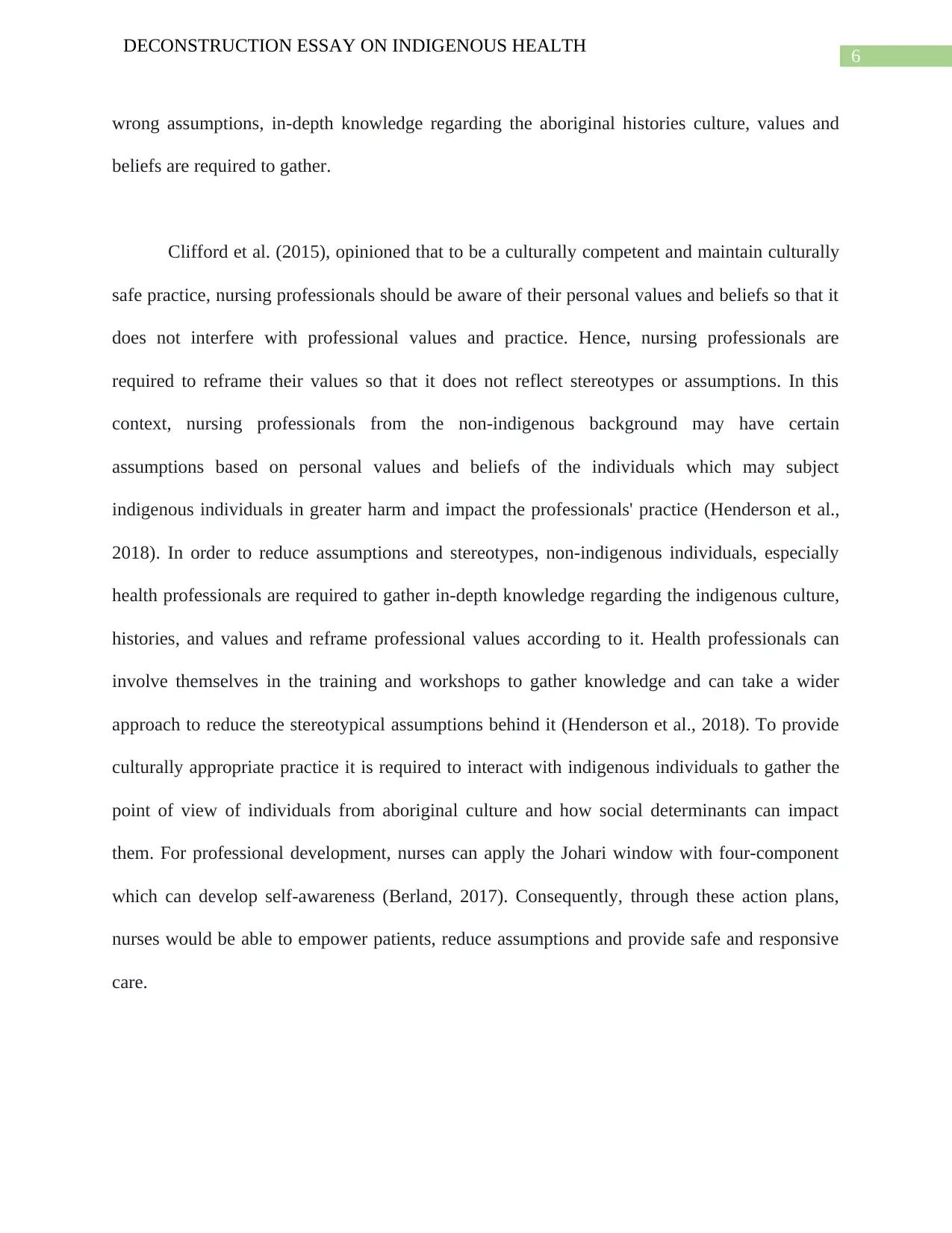
6
DECONSTRUCTION ESSAY ON INDIGENOUS HEALTH
wrong assumptions, in-depth knowledge regarding the aboriginal histories culture, values and
beliefs are required to gather.
Clifford et al. (2015), opinioned that to be a culturally competent and maintain culturally
safe practice, nursing professionals should be aware of their personal values and beliefs so that it
does not interfere with professional values and practice. Hence, nursing professionals are
required to reframe their values so that it does not reflect stereotypes or assumptions. In this
context, nursing professionals from the non-indigenous background may have certain
assumptions based on personal values and beliefs of the individuals which may subject
indigenous individuals in greater harm and impact the professionals' practice (Henderson et al.,
2018). In order to reduce assumptions and stereotypes, non-indigenous individuals, especially
health professionals are required to gather in-depth knowledge regarding the indigenous culture,
histories, and values and reframe professional values according to it. Health professionals can
involve themselves in the training and workshops to gather knowledge and can take a wider
approach to reduce the stereotypical assumptions behind it (Henderson et al., 2018). To provide
culturally appropriate practice it is required to interact with indigenous individuals to gather the
point of view of individuals from aboriginal culture and how social determinants can impact
them. For professional development, nurses can apply the Johari window with four-component
which can develop self-awareness (Berland, 2017). Consequently, through these action plans,
nurses would be able to empower patients, reduce assumptions and provide safe and responsive
care.
DECONSTRUCTION ESSAY ON INDIGENOUS HEALTH
wrong assumptions, in-depth knowledge regarding the aboriginal histories culture, values and
beliefs are required to gather.
Clifford et al. (2015), opinioned that to be a culturally competent and maintain culturally
safe practice, nursing professionals should be aware of their personal values and beliefs so that it
does not interfere with professional values and practice. Hence, nursing professionals are
required to reframe their values so that it does not reflect stereotypes or assumptions. In this
context, nursing professionals from the non-indigenous background may have certain
assumptions based on personal values and beliefs of the individuals which may subject
indigenous individuals in greater harm and impact the professionals' practice (Henderson et al.,
2018). In order to reduce assumptions and stereotypes, non-indigenous individuals, especially
health professionals are required to gather in-depth knowledge regarding the indigenous culture,
histories, and values and reframe professional values according to it. Health professionals can
involve themselves in the training and workshops to gather knowledge and can take a wider
approach to reduce the stereotypical assumptions behind it (Henderson et al., 2018). To provide
culturally appropriate practice it is required to interact with indigenous individuals to gather the
point of view of individuals from aboriginal culture and how social determinants can impact
them. For professional development, nurses can apply the Johari window with four-component
which can develop self-awareness (Berland, 2017). Consequently, through these action plans,
nurses would be able to empower patients, reduce assumptions and provide safe and responsive
care.
Paraphrase This Document
Need a fresh take? Get an instant paraphrase of this document with our AI Paraphraser
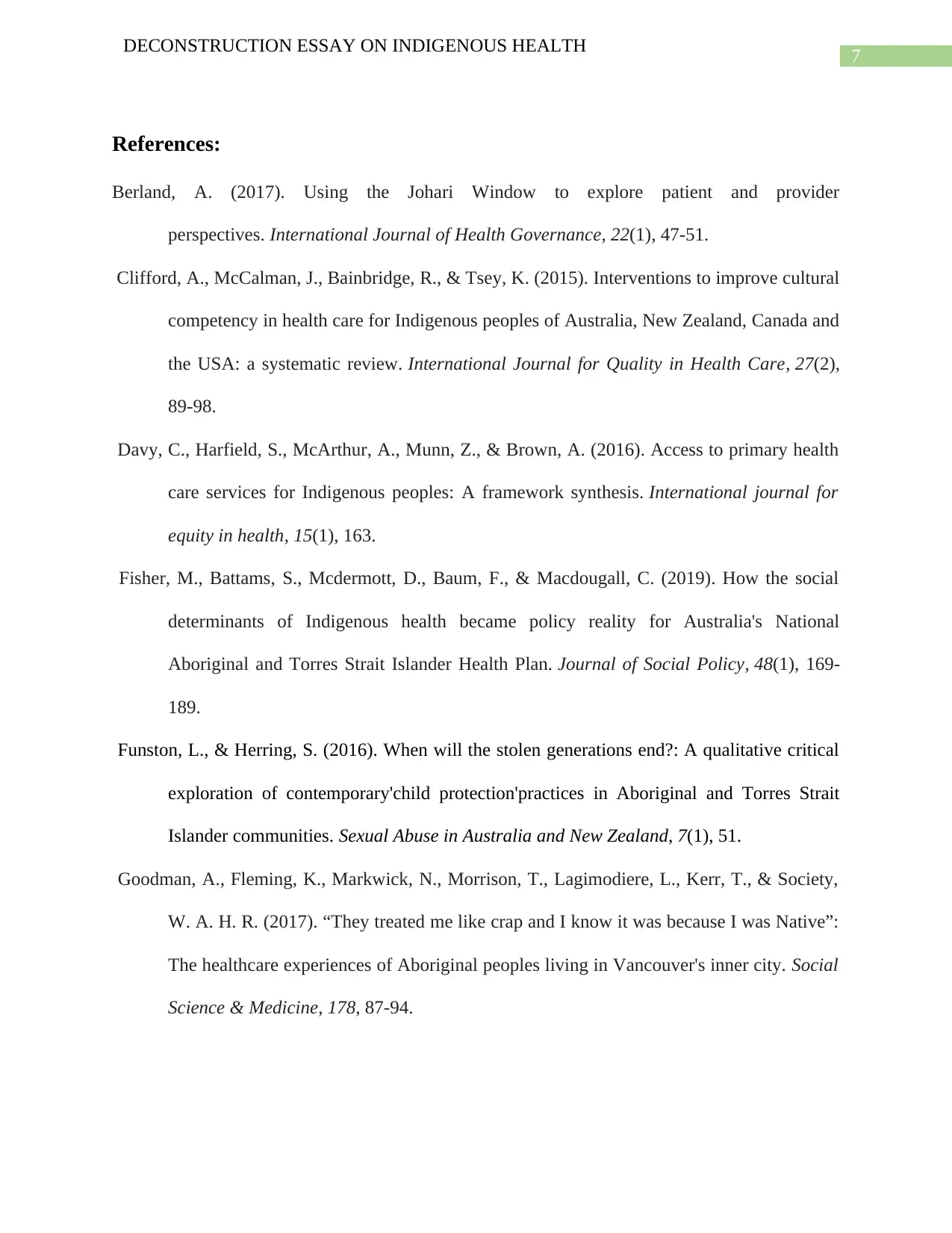
7
DECONSTRUCTION ESSAY ON INDIGENOUS HEALTH
References:
Berland, A. (2017). Using the Johari Window to explore patient and provider
perspectives. International Journal of Health Governance, 22(1), 47-51.
Clifford, A., McCalman, J., Bainbridge, R., & Tsey, K. (2015). Interventions to improve cultural
competency in health care for Indigenous peoples of Australia, New Zealand, Canada and
the USA: a systematic review. International Journal for Quality in Health Care, 27(2),
89-98.
Davy, C., Harfield, S., McArthur, A., Munn, Z., & Brown, A. (2016). Access to primary health
care services for Indigenous peoples: A framework synthesis. International journal for
equity in health, 15(1), 163.
Fisher, M., Battams, S., Mcdermott, D., Baum, F., & Macdougall, C. (2019). How the social
determinants of Indigenous health became policy reality for Australia's National
Aboriginal and Torres Strait Islander Health Plan. Journal of Social Policy, 48(1), 169-
189.
Funston, L., & Herring, S. (2016). When will the stolen generations end?: A qualitative critical
exploration of contemporary'child protection'practices in Aboriginal and Torres Strait
Islander communities. Sexual Abuse in Australia and New Zealand, 7(1), 51.
Goodman, A., Fleming, K., Markwick, N., Morrison, T., Lagimodiere, L., Kerr, T., & Society,
W. A. H. R. (2017). “They treated me like crap and I know it was because I was Native”:
The healthcare experiences of Aboriginal peoples living in Vancouver's inner city. Social
Science & Medicine, 178, 87-94.
DECONSTRUCTION ESSAY ON INDIGENOUS HEALTH
References:
Berland, A. (2017). Using the Johari Window to explore patient and provider
perspectives. International Journal of Health Governance, 22(1), 47-51.
Clifford, A., McCalman, J., Bainbridge, R., & Tsey, K. (2015). Interventions to improve cultural
competency in health care for Indigenous peoples of Australia, New Zealand, Canada and
the USA: a systematic review. International Journal for Quality in Health Care, 27(2),
89-98.
Davy, C., Harfield, S., McArthur, A., Munn, Z., & Brown, A. (2016). Access to primary health
care services for Indigenous peoples: A framework synthesis. International journal for
equity in health, 15(1), 163.
Fisher, M., Battams, S., Mcdermott, D., Baum, F., & Macdougall, C. (2019). How the social
determinants of Indigenous health became policy reality for Australia's National
Aboriginal and Torres Strait Islander Health Plan. Journal of Social Policy, 48(1), 169-
189.
Funston, L., & Herring, S. (2016). When will the stolen generations end?: A qualitative critical
exploration of contemporary'child protection'practices in Aboriginal and Torres Strait
Islander communities. Sexual Abuse in Australia and New Zealand, 7(1), 51.
Goodman, A., Fleming, K., Markwick, N., Morrison, T., Lagimodiere, L., Kerr, T., & Society,
W. A. H. R. (2017). “They treated me like crap and I know it was because I was Native”:
The healthcare experiences of Aboriginal peoples living in Vancouver's inner city. Social
Science & Medicine, 178, 87-94.
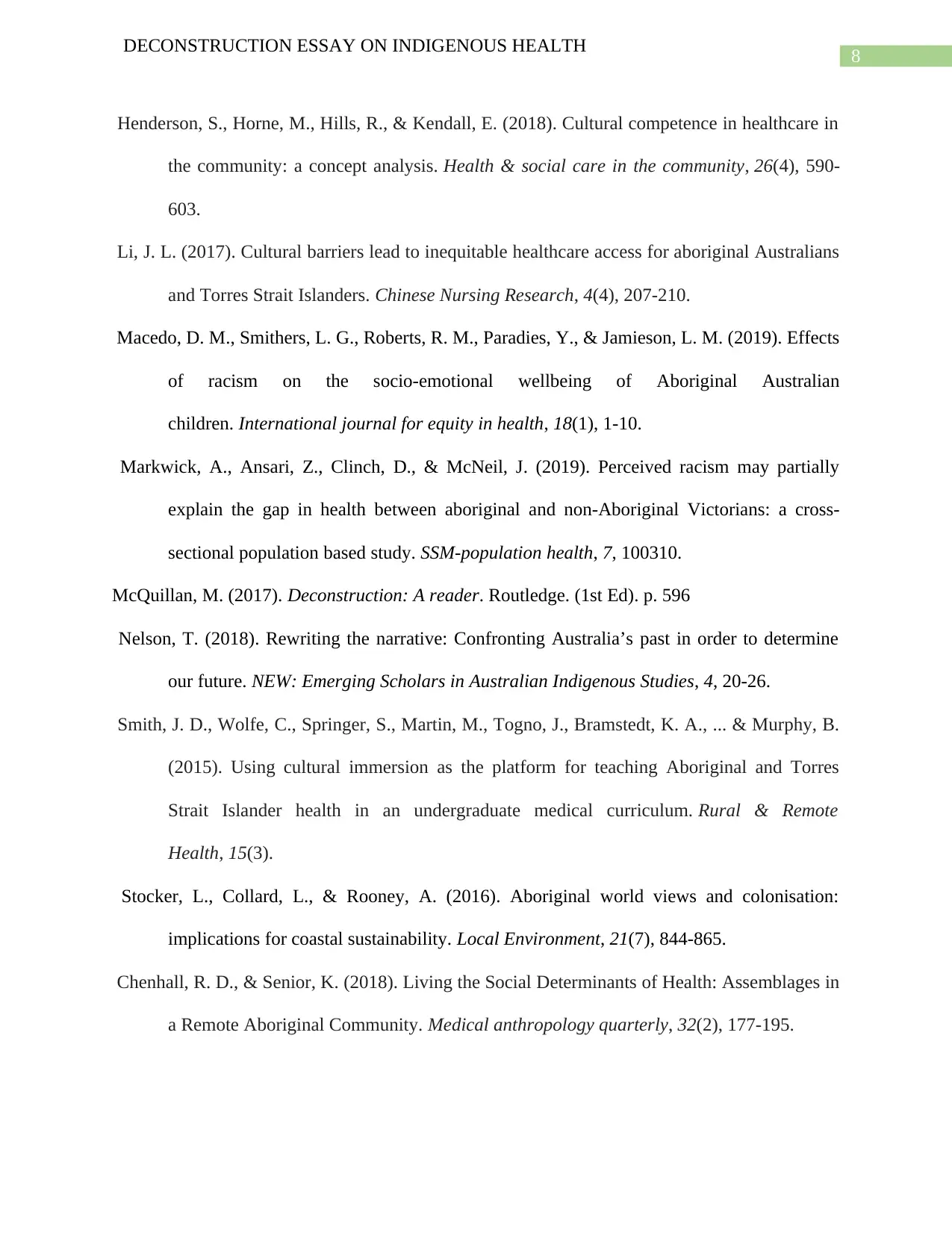
8
DECONSTRUCTION ESSAY ON INDIGENOUS HEALTH
Henderson, S., Horne, M., Hills, R., & Kendall, E. (2018). Cultural competence in healthcare in
the community: a concept analysis. Health & social care in the community, 26(4), 590-
603.
Li, J. L. (2017). Cultural barriers lead to inequitable healthcare access for aboriginal Australians
and Torres Strait Islanders. Chinese Nursing Research, 4(4), 207-210.
Macedo, D. M., Smithers, L. G., Roberts, R. M., Paradies, Y., & Jamieson, L. M. (2019). Effects
of racism on the socio-emotional wellbeing of Aboriginal Australian
children. International journal for equity in health, 18(1), 1-10.
Markwick, A., Ansari, Z., Clinch, D., & McNeil, J. (2019). Perceived racism may partially
explain the gap in health between aboriginal and non-Aboriginal Victorians: a cross-
sectional population based study. SSM-population health, 7, 100310.
McQuillan, M. (2017). Deconstruction: A reader. Routledge. (1st Ed). p. 596
Nelson, T. (2018). Rewriting the narrative: Confronting Australia’s past in order to determine
our future. NEW: Emerging Scholars in Australian Indigenous Studies, 4, 20-26.
Smith, J. D., Wolfe, C., Springer, S., Martin, M., Togno, J., Bramstedt, K. A., ... & Murphy, B.
(2015). Using cultural immersion as the platform for teaching Aboriginal and Torres
Strait Islander health in an undergraduate medical curriculum. Rural & Remote
Health, 15(3).
Stocker, L., Collard, L., & Rooney, A. (2016). Aboriginal world views and colonisation:
implications for coastal sustainability. Local Environment, 21(7), 844-865.
Chenhall, R. D., & Senior, K. (2018). Living the Social Determinants of Health: Assemblages in
a Remote Aboriginal Community. Medical anthropology quarterly, 32(2), 177-195.
DECONSTRUCTION ESSAY ON INDIGENOUS HEALTH
Henderson, S., Horne, M., Hills, R., & Kendall, E. (2018). Cultural competence in healthcare in
the community: a concept analysis. Health & social care in the community, 26(4), 590-
603.
Li, J. L. (2017). Cultural barriers lead to inequitable healthcare access for aboriginal Australians
and Torres Strait Islanders. Chinese Nursing Research, 4(4), 207-210.
Macedo, D. M., Smithers, L. G., Roberts, R. M., Paradies, Y., & Jamieson, L. M. (2019). Effects
of racism on the socio-emotional wellbeing of Aboriginal Australian
children. International journal for equity in health, 18(1), 1-10.
Markwick, A., Ansari, Z., Clinch, D., & McNeil, J. (2019). Perceived racism may partially
explain the gap in health between aboriginal and non-Aboriginal Victorians: a cross-
sectional population based study. SSM-population health, 7, 100310.
McQuillan, M. (2017). Deconstruction: A reader. Routledge. (1st Ed). p. 596
Nelson, T. (2018). Rewriting the narrative: Confronting Australia’s past in order to determine
our future. NEW: Emerging Scholars in Australian Indigenous Studies, 4, 20-26.
Smith, J. D., Wolfe, C., Springer, S., Martin, M., Togno, J., Bramstedt, K. A., ... & Murphy, B.
(2015). Using cultural immersion as the platform for teaching Aboriginal and Torres
Strait Islander health in an undergraduate medical curriculum. Rural & Remote
Health, 15(3).
Stocker, L., Collard, L., & Rooney, A. (2016). Aboriginal world views and colonisation:
implications for coastal sustainability. Local Environment, 21(7), 844-865.
Chenhall, R. D., & Senior, K. (2018). Living the Social Determinants of Health: Assemblages in
a Remote Aboriginal Community. Medical anthropology quarterly, 32(2), 177-195.
⊘ This is a preview!⊘
Do you want full access?
Subscribe today to unlock all pages.

Trusted by 1+ million students worldwide
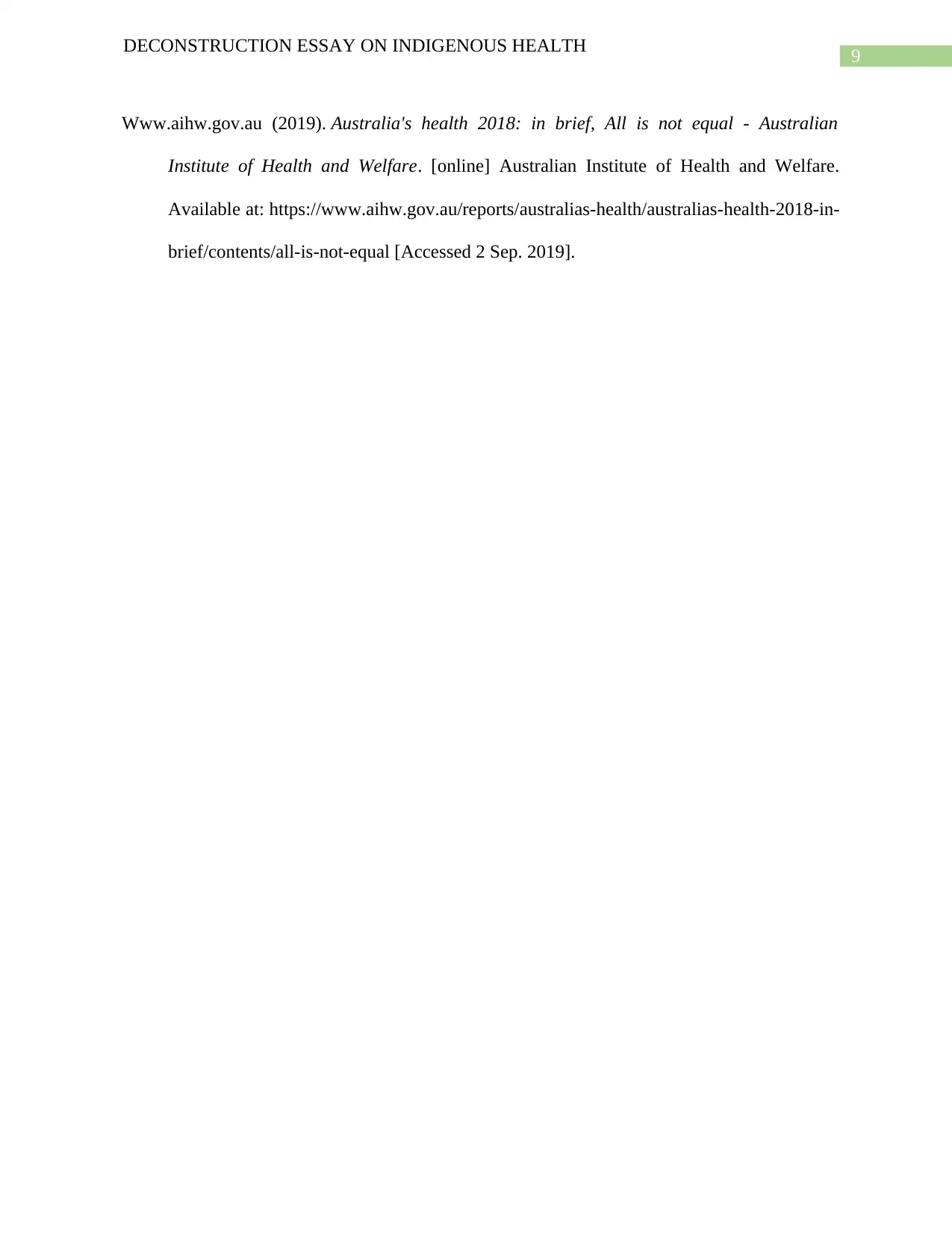
9
DECONSTRUCTION ESSAY ON INDIGENOUS HEALTH
Www.aihw.gov.au (2019). Australia's health 2018: in brief, All is not equal - Australian
Institute of Health and Welfare. [online] Australian Institute of Health and Welfare.
Available at: https://www.aihw.gov.au/reports/australias-health/australias-health-2018-in-
brief/contents/all-is-not-equal [Accessed 2 Sep. 2019].
DECONSTRUCTION ESSAY ON INDIGENOUS HEALTH
Www.aihw.gov.au (2019). Australia's health 2018: in brief, All is not equal - Australian
Institute of Health and Welfare. [online] Australian Institute of Health and Welfare.
Available at: https://www.aihw.gov.au/reports/australias-health/australias-health-2018-in-
brief/contents/all-is-not-equal [Accessed 2 Sep. 2019].
1 out of 10
Related Documents
Your All-in-One AI-Powered Toolkit for Academic Success.
+13062052269
info@desklib.com
Available 24*7 on WhatsApp / Email
![[object Object]](/_next/static/media/star-bottom.7253800d.svg)
Unlock your academic potential
Copyright © 2020–2026 A2Z Services. All Rights Reserved. Developed and managed by ZUCOL.





